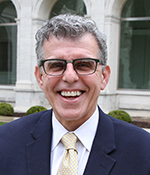November 2016

David Gozal, MD, MBA
Of the three ATS pillars, sleep is an emerging field, particularly in pediatrics. There is much we still don’t know, despite considerable progress this past decade. Childhood obstructive sleep apnea (OSA) has gone from just counting the number of obstructive events per hour of sleep to the understanding that this is a complex syndrome with multiple phenotypes.
The prevalence of childhood OSA is two to four percent but habitually snoring children account for four to five-fold that number. Lack of sleep or disrupted sleep can impose serious developmental consequences that may often translate into adverse consequences on school performance. Sleep deprived children become moody, are unable to concentrate, and fall asleep in class. Unless OSA is identified early and effectively treated, the adverse health effects may be carried into adulthood and potentially persist overtime, a feature that suggest that epigenetic phenomena may be operationally involved.
My research specializes in pediatric sleep disorders and pediatric pulmonology. We are beginning to discover childhood antecedents of adult disease. For instance, if you are genetically predisposed to cardiovascular disease, OSA may activate pathways that lead to either earlier or more severe disease manifestations. The sooner we are able to identify sleep apnea in children, the more we can do to prevent it from spilling over into adulthood.
However, many of our health care colleagues know little about the importance of sleep or the unique sleep needs of children. One of our jobs as a Society should be to educate providers coming face-to-face with our patients every day, whether in the ER, urgent care, or primary care settings. Through the ATS International Conference and Assemblies, we are forming networks and alliances that enrich our understanding of the many diseases that are part and parcel of our specialty. Yet the sharing of information mustn’t end there.
We are each other’s inter-professional resources. We are the village, and we can only develop more healthy adults by raising more healthy children.
ATS Statements, Guidelines & Reports
Learn more about official documents including clinical practice guidelines, policy statements, research statements, technical standards, and workshop reports, many of which are developed collaboratively with other professional societies.

